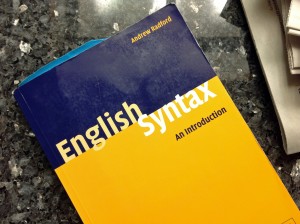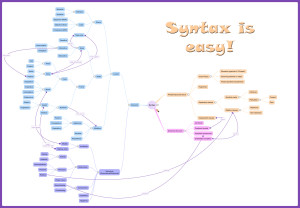Verbs, Part 4: Theta-Roles, or How to Eliminate Passive Voice

The discussion in this post requires a different view of language structure. For a deeper understanding, I refer you to Andrew Radford’s English Syntax: An Introduction (ISBN 0521542758), particularly pp. 190-193 . Much of this post draws from that source.
Objectives:
- Identify the theta-roles assigned to nouns by verbs.
- Revise Passive Voice from sentences by using verbs with alternate theta-role assignments.
Skill level: Advanced
Read More »Verbs, Part 4: Theta-Roles, or How to Eliminate Passive Voice
